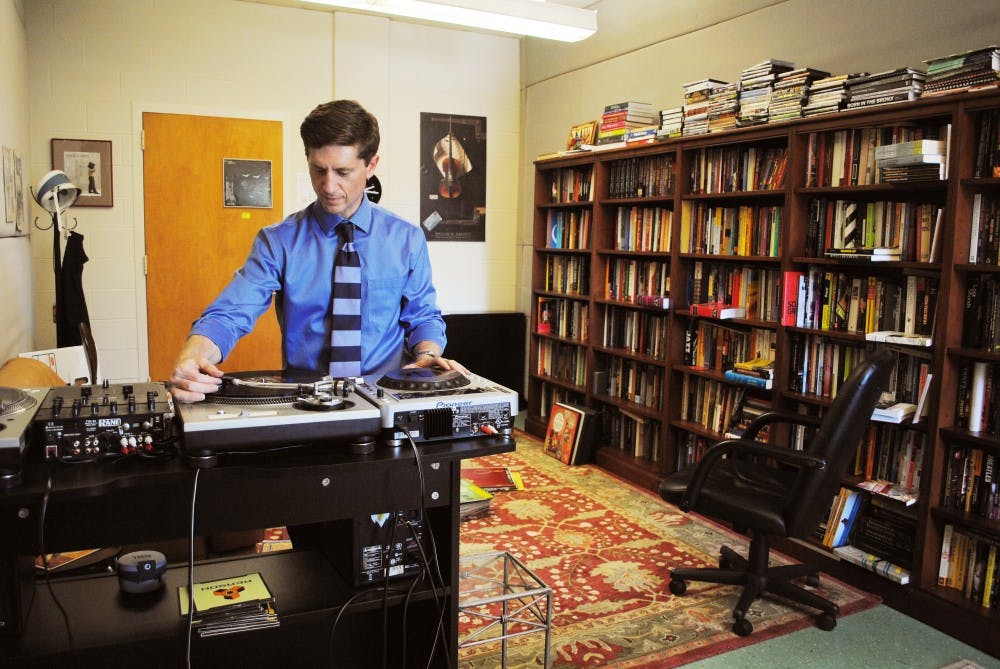A rebellious new genre of contemporary music is now seeking placement in university music departments after taking America’s youth by storm. Providing a soundtrack to parties, this new form sharply contests most long-held rules of classical composition.
This genre is jazz, and the year is 1946.
That year, the University of North Texas became the first university to offer a jazz degree. It was then called the “laboratory band” program, as “dance band” was deemed inappropriate.
Mark Katz, professor and chairman of UNC’s department of music, sees the historic adoption of jazz performance courses as an analog for the adoption of contemporary music performance courses today — and he’s reimagining the music department to teach much more than Tchaikovsky and Liszt.
“Music is a living tradition and we’re not studying classics — something that happened a long time ago — we’re studying something that continues to this day,” Katz said.
“We study older music but we should study all forms of music and encourage all forms of music making.”
This desire to innovate led to the foundation of the Beat Making Lab within the University’s music department last year. The course, taught by producer Apple Juice Kid (Stephen Levitin) and professor Pierce Freelon, offers students college credit for the study of hip-hop and electronic music production.
Other courses have previously represented contemporary genres, such as hip-hop, but usually in the context of history or literature courses. The Department of African and Afro-American Studies at UNC offers a course taught by Perry Hall; Duke offers a course taught by producer 9th Wonder (Pat Douthit) and Mark Neal.
“For me, hip-hop simply functions as an alternative vehicle to explore the issues of community, identity and political engagement that are related to my research,” said Neal in an e-mail. “As such, hip-hop culture represents a unique interdisciplinary space.”
Katz said basing courses in performance is an innovation. “I thought it would really be great if we could teach not just the history of popular music, but how to compose and perform popular music,” he said.
In addition to the Beat Making Lab, he’s scheduled a DJ Lab for next spring with hopes of adding a Rock Lab and an MC Lab.
These expansions have been spurred by the Beat Making Lab’s success.
“Popular music has really gravitated towards electronic creation,” Levitin said. “And I think it’s great that it’s being taught at a university level along with the jazz studies and the classical music studies.
“I think it’s just a step into the present and future of where music instruction needs to be to engage students and have them prepared for the real world after college.”
And students are definitely engaging with the music.
“The student reaction has been overwhelmingly positive,” Katz said. So much so that the professors have had to start taking admission essays from students who wish to enroll in the course.
“It wasn’t because they knew who the teachers were, it was because they knew the subject and they knew the music and wanted to be part of that,” Katz said. “Clearly, there are many students on campus who either already do this and want to learn in a more formal or structured way, or people who want to.”
Julian Caldwell, a senior, is a Beat Making Lab alum and campus rapper who performs under the name JSWISS. He said that he and many other students take hip-hop performance to be a serious and relevant area of study.
“People almost assume, like, ‘Oh, well they’re just students just like us so they kind of do this for fun,’” Caldwell explained. “But it’s really having to show people like, ‘No, we do this for real.’”
Likewise, professional rapper Charlie Smarts (of the popular Raleigh-based hip-hop group Kooley High, born Alexander Thompson), feels that his college experience was defined by his involvement with hip-hop. An alumnus of N.C. State University, Thompson initially majored in chemical engineering, dropped out, then returned to study business and pursue a rap career.
“That’s when I really started having fun as a student, when I saw a bunch of people that were interested in hip-hop the way that I was,” Thompson said.
The entrepreneurial attitude shared by Caldwell and Thompson is one that’s echoed in the Beat Making Lab, as well as much of hip-hop culture.
“The musicians, the beat makers and the rappers, they have not had a traditional professional career path to follow — they had to invent it,” Katz said.
“The entrepreneurial aspect of beat making is really integral to the history and to the music.”
To emphasize the role of arts entrepreneurship in music education, Katz recently appointed Ken Weiss, music industry veteran and leader in UNC’s arts entrepreneurship minor, as the music department’s entrepreneur in residence.
In the new position, Weiss will serve as a resource to students interested in music careers.
Weiss shares Katz’s enthusiasm for contemporary music performance courses.
“I think what Mark is doing in the music department is revolutionary,” Weiss said.
“It’s unique to universities, and it’s something that anybody who’s interested in music will benefit from.”
Weiss also shares Katz’s insight about the new and provocative becoming the accepted and the norm.
“I was pretty sure when I heard The Beatles for the first time that you wouldn’t be hearing them in the dentist’s office 30 years later,” he said.
“It’s just too radical, too revolutionary, too extraordinarily different, I’d never heard anything quite like it. And now it’s like, ‘Well, of course they’re in the dentist’s office.’
“So hip-hop? Sure, why not?”
Contact the desk editor at diversions@dailytarheel.com.
To get the day's news and headlines in your inbox each morning, sign up for our email newsletters.




